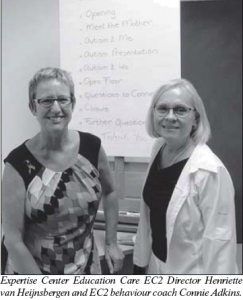The Daily Herald writes that since early April, Expertise Center Education Care EC2 implemented a multi-media autism awareness campaign on Saba, including a presentation by behaviour coach Connie Adkins in St. John’s. Wednesday’s event targeted parents, teachers, students, caregivers and guardians in particular. It was part of similar efforts such as the online Internet dissemination of autism information via Website www.ec2saba.org, an informative programme on the local public television channel and counselling sessions.
EC2 was established in 2011 by Director Henriette van Heijnsbergen as a support centre to meeting developmental, learning and behavioural needs of pupils, teachers and parents. With the support of specialists EC2 councils on social-emotional, speech and communication skills, parenting and teaching strategies, it assesses learning ability, the physical and behavioural development of the child, while also conducting workshops for guidance officers.
Adkins provided an overview of the common characteristics in the autistic spectrum such as deficits or differences in social skills and communication skills. Among social-skill challenges she detailed the “lack of awareness of the existence or feelings of others, the impairment in the ability to relate to others” and other appearances of aloofness. She pointed to challenges in showing emotions, avoidance of eye contact, challenges with changes in environment and routine or in interacting opportunities and the inability to engage in cooperative play. Attempting to train care givers in picking up signs associated with autism, Adkins mentioned failure to initiate or sustain conversations or understand verbal and non-verbal language, irregularity in speech intonation, poor receptive skills or the tendency to echo words or use tantrums to signal distress. Adkins also mentioned signals such as repetitive movements, “hand flapping, finger flicking, rocking, hand clapping, grimacing or eye gazing.” Among key diagnosis signals is frequent distress caused by seemingly trivial changes in the environment or insistence on following routines in precise detail.
The presentation provided care givers with strategies on how to address the needs of autistic children. The main advice involved keeping structured routines, using visual prompts in the learning process and creating predictability through schedules, while reducing potential distractions in the study environment. Adkins stressed that autistic children are not rude but simply do not pick up on social cues and that caregivers should “never, ever speak about the child in front of them as if they are not present.” She encouraged them to use minimal simple wording while phrasing tasks and activities, but to persist in the child gaining independence in accomplishing tasks despite this taking much longer. Rewarding and praising children improves their performance. Adkins outlined classroom strategies and directed them to online resources such as www.autism-society.org and www. autismspeaks.org.
 Archive of posts from Saba-News.com Archive Saba News
Archive of posts from Saba-News.com Archive Saba News
